Английские фразовые глаголы
Фразовые глаголы — это глаголы, за которыми следует предлог. Их огромное множество. Например, только у make около 9 фразовых глаголов (make out, make of, make for…), и каждый этот глагол имеет по несколько значений. А ведь есть еще get, take, let, go и другие. Но, не обязательно заучивать их все, для общения вам пригодится лишь некоторая часть, то есть те фразовые глаголы, которые чаще всего употребляются в речи. А они, кстати очень часто используются носителями. Ниже приведен список разных фразовых глаголов, просто запомните самые актуальные для себя:
Действия
- give up — сдаваться, прекращать
- There was a moment when I just wanted to give up. В какой-то момент я хотел(а) просто сдаться.
- find out — выяснить, узнать
- Let’s go find out who that number belongs to. Пойдем разузнаем, кому принадлежит этот номер.
- take off — взлететь, быстро уйти
- Take off your shoes please. Пожалуйста, сними обувь.
- Our plane is ready to take off. Наш самолет готов к взлету.
- go on — продолжать
- We can’t go on like this any more. Больше так продолжаться не может.
- What’s going on here? Что здесь происходит?
- look after — заботиться, присматривать
- It’s hard work looking after three children all day. Заботиться о трёх детях целый день очень тяжело.
- come across — наткнуться, случайно найти
- I came across a word I’d never seen before. Я наткнулся на слово, которое никогда раньше не видел.
- put up with — терпеть, мириться с чем-либо
- We have to put up with this for another 3 years. Нам придется терпеть это еще З года.
- come up with — придумывать
- It is the intention of Government to come up with a Media Bill. Правительство намерено придумать законопроект о средствах массовой информации.
- look up to — уважать, брать пример
- Someone I could look up to. Кто-то, на кого я мог бы равняться.
Здоровье
- Pass away (die) — умереть.
- His aunt passed away last night. Его тетя умерла прошлой ночью.
- Run over (hit by a vehicle) — сбить на транспортном средстве, переехать.
- He was run over by a car. Его сбила машина.
- Break out (start suddenly) — вспыхивать.
- I’ve broken out in a rash. У меня моментально высыпало / Я резко покрылся сыпью.
- Fight off (to free yourself from an illness) — побороть болезнь.
- Eat oranges to help fight off a cold. Ешь апельсины, чтобы побороть простуду.
- Come to/come round (become conscious) — прийти в себя, очнуться.
- Has he come to yet? Он ещё не очнулся?
- When he came round, he was in shock. Когда он пришёл в себя, он был в шоке.
- Pass out (faint, lose consciousness) — упасть в обморок.
- She passed out from the heat. Она упала в обморок от жары.
- Get over (recover from sth) — выздороветь.
- I finally got over my cold. Я наконец-то вылечилась от простуды.
- Come down with (become sick (not serious)) — приболеть.
- I think I’m coming down with the flu. Мне кажется я заболеваю гриппом.
- Throw up (be sick, vomit) — вырвать, тошнить.
- He threw up all over his shoes. Его вырвало на свои ботинки.
- He threw up all over his shoes. Его вырвало на свои ботинки.
Внешность
- dress up — наряжаться
- go with — сочетаться подходить
- have on — быть одетым во что-то
- pull on — натягивать, быстренько надевать
- pull off — стаскивать, быстро снимать
- show off — хвастаться красоваться
Отношения
- check out — глагол с миллионом значений, сегодня, раз уж мы говорим об отношениях, он означает «зацени».
- Wow check out that good looking guy over there. Вау, зацени того симпатичного парня вон там.
- hit on — флиртовать, приставать.
- He was hitting on me, with steaming looks. Он флиртовал со мной с обжигающим взглядом.
- chat up — заигрывать в разговоре.
- He spent all evening chatting her up. Он провел весь вечер заигрывая с ней.
- ask out — приглашать на свидание.
- Jack asked me out to the movies on Friday. Джэк пригласил меня на свидание в кино в пятницу.
- fall for — влюбиться в кого-то.
- She always falls for older men. Она всегда влюбляется в мужчин постарше.
- make up — тоже глагол с миллионом значений, в данном случае означает «помириться».
- They kissed and made up as usual. Они поцеловались и помирились, как обычно.
- cheat on — изменять.
- She found out that he’d been cheating on her. Она выяснила, что он изменял ей.
- break up — расстаться.
- Jenny and George have broken up. Дженни и Джордж расстались.
- split up — тоже самое, что и break up — расстаться.
- Her parents split up a few months ago. Ее родители расстались несколько месяцев назад.
- get back together — снова сойтись с бывшим/бывшей.
- I kept hoping we would get back together. Я продолжала надеяться, что мы снова сойдемся.
Вождение
- To drop off (To take someone to a place in a car, usually without getting out of the car yourself) — подбросить, завезти, подвезти кого-то.
- Is there any chance that you could drop off Max? Ты не могла бы подвезти Макса?
- To pull up (If a vehicle or driver pulls up, they stop) — остановиться, притормозить.
- And as soon as he pulled up, that girl started screaming and ran off. Как только он остановился, эта девушка начала кричать и убежала.
- To draw up (If a vehicle draws up, it arrives at a place and stops) — останавливаться, подъезжать.
- The cab drew up outside the house. Такси остановилось около дома.
- To knockdown (To hit someone with a vehicle so that they are injured or killed) — сбить.
- She was almost knocked down by a car. Ее чуть не сбил автомобиль.
- To run over (To hit someone or something with a vehicle and drive over them) — переехать, задавить.
- He was run over by a lorry. Его задавил грузовик.
Деньги
- To splash out — баловать себя, тратить ради удовольствия.
- I splashed out $200 on a new dress last week. Я потратила $200 на новое платье на прошлой неделе.
- Save up — копить.
- I am saving up for a trip to Thailand. Я коплю на поездку в Тайланд.
- Pay back — возвращать долги.
- Please, lend me $5. I“ll pay you back tomorrow. Пожалуйста, одолжи мне 5$, я верну тебе завтра.
- Get by — сводить концы с концами.
- It“s difficult to get by with my low salary. Тяжело сводить концы с концами с моей маленькой зарплатой.
Для вечеринки
Ask over — приглашать к себе в гости.
- Can I ask you over for dinner on Sunday night? Я могу пригласить тебя к себе на ужин в воскресенье вечером?
Drop in — приходить без предупреждения.
- I don`t mind when my friends drop in. Я не против, когда друзья приходят ко мне без предупреждения.
Bring over — приносить что-то, приводить кого-то.
- He`s bringing his new girlfriend over to our place tonight. Он приведет с собой новую девушку к нам сегодня вечером.
Tag along — пойти на вечеринку за компанию, без приглашения.
- We`re going to that party. Do you want to tag along? Мы идем на ту вечеринку. Пойдем с нами за компанию?
Фразовые глаголы с предлогом in
Предлог IN означит в / внутрь / внутри, соответственно, и глаголы в сочетании с этим предлогом чаще всего будут иметь похожее значение.
GET IN — попасть внутрь.
- How did the thieves get in? Как воры проникли внутрь?
LET IN — войти внутрь/зайти
- Here’s the key, so you can let yourself in. Вот ключ, так что ты можешь зайти.
DIVE IN — нырять
- Sally walked up to the edge of the pool and dived in. Сэли подошла к краю бассейна и нырнула.
MOVE IN — въезжать
- I’ve got a new flat. I’m moving in on Friday. У меня новая квартира. Я въезжаю в пятницу.
НО встречаются и глаголы, которые не совсем логично сочетаются с IN. Их уже сложнее запомнить:
DROP IN/CALL IN — заскочить, заехать / зайти в гости без предупреждения.
- I dropped in to see Chris on my way home. Я заскочила, чтобы увидеться с Крисом по дороге домой.
JOIN IN — присоединиться
- We’re playing a game. Why don’t you join in? Мы играем. Почему бы тебе не присоединиться?
PLUG IN — включить в розетку
- The fridge isn’t working because you haven’t plugged it in. Холодильник не работает, потому что ты не включил его в розетку.
FILL IN — заполнять
- Please fill in the application form and send it to us by 28 February. Пожалуйста, заполните заявление и отправьте нам до 28 февраля.
TAKE somebody IN — обмануть / предать кого-либо.
- The man said he was a policeman and I believed him. I was completely taken in. Мужчина сказал, что он полицейский, и я поверил ему. Я был обманут.
Это интересно
[ kʌm əˈkrɒs ]
1. Встретить или найти что-то случайно
2. Производить впечатление
3. Быть понятым
4. Снабжать чем-то по необходимости
1. Встретить или найти что-то случайно
Sheep dog attacks not a nice thing to come across.
Нападения собак на овец не очень приятная вещь, с которой приходится сталкиваться.
В этом варианте перевода у Come Across есть синонимы Run Across и Run Into, которые по-русски звучат абсолютно одинаково: внезапно встретить, наткнуться. Но есть одна особенность применения.
I came across a word I’d never seen before.
Я наткнулся на слово, которого никогда раньше не видел.
She came across some old photographs in a drawer.
Она наткнулась на старые фотографии в ящике стола.
This technology’s unlike anything we’ve come across.
Эта технология не похожа ни на одну из тех, с которыми мы сталкивались.
2. 2. Производить впечатление
She comes across as very self-confident.
Она выглядит очень уверенной в себе.
He came over as a sympathetic person.
Он показался мне отзывчивым человеком.
3. Быть понятым
What comes across in his later poetry is a great sense of sadness.
То, что сквозит в его более поздних стихах, – это огромное чувство печали.
He spoke for a long time but his meaning didn’t really come across.
Он говорил долго, но смысл его слов на самом деле не доходил до меня.
4. Снабжать чем-то по необходимости
В этом варианте перевода используется конструкция Come Across With something.
I hoped she’d come across with some more information.
Я надеялся, что она поделится еще какой-нибудь информацией.
You had better come across with what you owe me. You owe me money, and I wish you would come across.
Тебе лучше признаться в том, что ты мне должен. Ты должен мне денег, и я бы хотел, чтобы мы встретились. (тут фразовый глагол выступает в двух ипостасях)
- ★ Фразовые глаголы с COME
- ★ Фразовые глаголы с предлогом ACROSS
- ★ Фразовые глаголы с предлогом WITH
Let’s learn 10 of the most common phrasal verbs used in English speaking.
<<<Subscribe on iTunes>>> <<<Watch on Youtube>>>
What are the most common phrasal verbs in English?
Hello everybody!
I am trying not to melt down here because in Poland the weather it’s crazy. And how are you doing? How is your summer going? Or maybe it’s winter where you live? So what’s going on with you?
If you have noticed, I have used a lot of phrasal verbs in my welcoming speech to our today’s episode.
We have already talked about phrasal verbs but they are so popular in conversational English – I want to continue talking about them.
What is a phrasal verb?
If you remember, a phrasal verb – it is a combination of a verb with a preposition forming a new meaning.
For example, the first meaning of the verb to get is ‘to receive’: to get a message, to get an email, to get a package.
But when I add the preposition ‘down’ to get, it means ‘to disappoint’. E.g. You got me down. Don’t get me down.
It is a shorter version of the verb ‘disappoint’ and this is very popular in English.
If you want to speak English fluently and understand the native speakers, you need to know phrasal verbs.
1. TO FIGURE OUT
‘Figure out’ means ‘to understand’.
Examples:
- I can’t figure out what to do.
- Give me a minute to figure it out.
- I couldn’t figure out what the teacher was talking about.
2. TO WORK SOMETHING OUT
We can say ‘to work out something’ or we can say ‘to work something out’ which means ‘to find a solution’.
Examples:
- Don’t worry about this problem – we will work something out (=We will find some solution).
- I can’t work out what to do.
- An international peace plan has been worked out.
3. TO POINT OUT
It means ‘to show you’.
Examples:
- I’d like to point out the main things you need to remember.
- He pointed out the best beaches on the map.
- In my next video, I will be pointing out the main mistakes non-native English speakers make in emails.
4. TO BRING UP
This verb means ‘to start talking about some topic’.
Examples:
- Well, she just got divorced. Don’t bring up her husband in the conversation. (= don’t mention him, don’t talk about him).
- Why did you bring it up? = Why did you start speaking about that?
- Don’t bring up politics in our conversation.
If you don’t know this phrasal verb, it will be quite a long phrase. In speaking, we try to express a complex idea in a very short phrase.
5. TO GO ON / TO CARRY ON
Now, we have two similar verbs meaning ‘to continue’.
You can say either to go on or to carry on + the Ving form of the verb.
Examples:
- Let’s carry on talking about phrasal verbs.
- Carry on. You’re doing fine.
- Carry on teaching us, don’t stop!
6. TO COME ACROSS
This next one is very unpopular with the non-native speakers but native speakers of English use it very much.
To come across means ‘to find something by chance’.
Examples:
- Did you come across any interesting books lately? = ‘Did you find any interesting books?’
- I came across a word I’d never seen before.
- Well, who knows what we will come across? = ‘Who knows what we will find?’
7. TO MAKE UP
There are so many combinations with make in English – it’s often confusing for English learners.
What can make up mean? It can mean three things (even more, but let’s stick here for now).
Its first meaning is ‘to create’ (to make up a story).
Examples:
- Let’s make up some topic for our party
- Stop making up excuses.
- It’s not true. I just made it up.
It can also be a noun meaning ‘the cosmetics’. It is what I am trying to wear on my face in this weather! You can say ‘to put on make-up’, ‘to wear make-up’, ‘to remove make-up’ etc.
Examples:
- I am wearing makeup at this moment.
And another meaning of ‘to make up’. I’ve already talked about it in one of my videos.
To make up means ‘to become friends again after the fight’.
When you have a fight, it is to fall out. But when you stop having troubles in relationships, it’s to make up.
Examples:
- We fell out a week ago, but we have already made up. = ‘we are friends again’.
- They argue a lot, but they always kiss and make up.
8. TO MAKE OUT
One of the meanings of this extra-popular phrasal verb is ‘to understand from listening’ or ‘to see in the dark’, to be able to understand and see.
Examples:
- What did you say? I couldn’t make it out.
- She can’t make out what he is saying.
- I am not sure it was him. It was difficult to make him out.
There is no word for it in English, you can only express this idea with the help of this phrasal verb.
9. TO FILL IN / TO FILL OUT
There are two different versions of the phrasal verb meaning ‘to complete’.
In British English, we will say to fill in.
- Please fill in this form.
- Can you fill in this form?
In American English, we will say to fill out:
- Can you fill out this form?
- I need to go and fill out my visa application.
10. TO GIVE UP
And the last but not the least. It’s one of the most used phrasal verbs in English.
To give up means ‘to stop’ but it’s more emotional. You give up when you stop trying.
Examples:
- I’ve given up learning German.
- Don’t give up trying to make money online. One day it will work!
- I didn’t know you gave up yoga.
So please don’t give up learning English!
I hope you know all these phrasal verbs now.
Try to recognise them in English speaking: in the podcasts, news, stories – anything you read or hear. And try to use them in your own speaking step by step.
I hope you have enjoyed the episode. Thanks for listening!
Learn more phrasal verbs
Episode 24 Phrasal Verbs about Travel
Episode 31 Phrasal Verbs about Learning
Episode 36 Phrasal Verbs about Using the Phone
Free Guide ’55 Common Phrasal Verbs’
Download our free e-book teaching you the most widely used phrasal verbs in English speaking.
Click the card to flip 👆
to find something by chance
— He __________ some of his old love letters in his wife’s desk.
— I _______ a word I’d never seen before.
— Have you ever _______ such a horrible person in all your life?
— I’ve never _______ anyone quite like her before.
— We’ve _______ a few problems that need resolving.
натолкнуться, повстречать
make a particular impression
— A lot depends on how well you _______ in the interview.
— I don’t think I _______ very well (=seemed to have good qualities) in the interview.
— He _______ as a bit of a bore in interview.
— She _______ as a very intelligent sensitive man.
— She _______ as very self-confident.
— She _______ really well (= creates a positive image) on television.
произвести/производить впечатление, показаться
to make progress or get better in quality,
skill or health, develop, improve
— How is Sarah ____ing ____ her photography course?
— How’s Kathleen ____ing ____ with her swimming?
— The building work was ____ing ______ nicely.
— Hassan’s English is really ____ing ____.
— Your English is ____ing ____ really well.
— He opened the oven door to see how the food was ____ing ____.
продвигаться, преуспевать
to receive blame or criticism
— Fast food has ________ more criticism from the press.
— The director has ________ a lot of criticism over his handling of the affair.
— The Belfry ________ criticism with some newspapers saying it was no place to stage a match of this importance.
— NTOs have ________ criticism for failing to make significant strides in plugging the skills gap.
— I suppose I ________ some heavy criticism.
подвергаться критике
to arrive, or appear at a place, or to become available
— Go now and I’ll ________ later.
— You wait half an hour for a bus, then three ________ at once!
— He decided to give the money to the first stranger who _________.
— A bus should _______ any minute now.
— Take any job opportunity that ________.
— He told me to work hard and take every opportunity that _________.
— We were just standing talking when Jamie ________.
— Pete ________ in his car and offered us a lift.
появляться (приезжать, приходить, возникать)
to cause an argument or disagreement between
two people
— Don’t let one little quarrel _______ you.
— I don’t want the problem of money ___ing ____ us.
— He didn’t want this to _______ them.
— Nothing will ever _______ us now.
— She never let anything _______ her and her work.
встать между, спровоцировать раздор, разлад, ссору
meet or join in order to do something
— I remember how the community _______ and were so supportive of each other.
— The convention gives us a chance to _______.
— We’d _______ to share our thoughts and experiences.
— I remember how the community ________ and were so supportive of each other.
объединиться, собраться
Sets found in the same folder
Other sets by this creator
Verified questions
vocabulary
Verified answer
Recommended textbook solutions
Other Quizlet sets
Работе над лексической стороной речи на всех этапах обучения английскому языку отводится большое место. Ведь лексика в системе языковых средств является важнейшим компонентом речевой деятельности: аудирования и говорения, чтения и письма. Опыт преподавания показывает, что наибольшие трудности для учащихся представляет именно лексическая сторона речи. Особенную трудность для учащихся представляют, так называемые, фразовые глаголы. Фразовые глаголы очень распространены в нейтрально-неформальном английском. Сегодняшний английский невозможен без тысяч фразовых глаголов, оживляющих речь. Они служат разговорными заменами формальных латинских глаголов. Например, postpone = put off (откладывать), exit = get out (выходить), и т. д.
Каждый изучающий английский должен знать хотя бы основные фразовые глаголы, а также производные от них нарицательные существительные и составные прилагательные.
В модулях УМК «Английский в фокусе» обычно предлагается список из 5-8 фразовых глаголов, сгруппированных по глаголу (например, фразовые глаголы с get, come, run и т.д.). Обычно для тренировки предлагается упражнение на заполнение пропусков подходящими по смыслу предлогами. Количество этих упражнений не достаточно для облегчения запоминания фразовых глаголов, поэтому для отработки лексических навыков, я стараюсь предложить учащимся разнообразных упражнений, которые обеспечивают многократное повторение глаголов, а также позволяют перевести их в активный словарь.
1. Упражнение, которое можно использовать, как языковую разминку в начале урока, или как физкультминутку в середине урока.
Ученик выходит к доске, тянет карточку и изображает ситуацию, описанную на ней. Остальная группа старается угадать, что он изображает, используя в ответе фразовые глаголы. Угадавший правильно, занимает место у доски.
Примеры карточек с ситуациями:
You are in bed. You wake up and turn off the alarm clock.
You are standing at a bus stop, waiting for the bus.
You are in a restaurant. You are sitting down and looking at the menu.
You are blowing out the candles on your birthday cake.
You are reading a newspaper when you see a picture of your favourite film star. Cut the picture out and put it up on your wall.
You are in a clothes shop and you run into your old friend.
2. Ученики работают в парах. Каждая пара получает листок с двумя новыми фразовыми глаголами. Они должны составить с ними предложения, но вместо фразового глагола они вставляют слово puff. Затем предложения зачитываются вслух, и остальные ученики должны догадаться, какой глагол скрывается за словом puff.
Например: It was very cold yesterday, so I puff my warm jacket. (фразовый глагол put on)
3. Каждый ученик получает опросный лист и должен опросить своих товарищей.
Учащийся задает один и тот же вопрос, пока не найдет, того, кто ответит «да», тогда он должен задать дополнительные вопросы и записать ответы в таблицу. Затем переходит к следующему вопросу. Пример опросника:
|
Find someone who |
Name |
More information |
|
is going to look after children this week. |
||
|
is eating out tonight. |
||
|
has looked up a word in English today. |
||
|
is planning to get away at the weekend. |
||
|
is going to dress up this weekend. |
||
|
woke up early this morning. |
||
|
is looking forward to something. |
||
|
has taken something back to a shop |
4. Групповая работа. Группа делится на две команды. Учитель пишет на доске глагол (get, come, put, etc). Каждая группа должна за пять минут придумать как можно больше предложений, используя глагол, как фразовый. Побеждает группа, которая составит больше правильных предложений.
5. Упражнения на фразовые глаголы с take.
Fill in after, in, out, over, off or up.
-
If I lose any more weight I will have to take all my clothes ….
-
When his father retired he took … the company.
-
I’ll take this dress … at the waist – it’s too big.
-
The narcotic dealers took … the city. They control business, politics, everything.
-
It was so warm outside that she took … her jacket.
-
The dictator hoped to take … the world little by little.
-
Erica takes … her mother with her bad temper.
-
I’m not very good at golf – I only took it … recently.
-
I took … water-skiing during a seaside holiday.
-
It’s the custom to take … you shoes when you go into the house.
-
She took her clothes … and got into bed.
-
Dad’s taking the whole family … to the cinema on Saturday.
-
Becky is really pretty. She takes … her mother.
-
We’re taking my parents … for a meal next week.
-
He’s always been shy – he takes … his father.
6. Упражнения на фразовые глаголы с pick.
Match the verbs to their definitions.
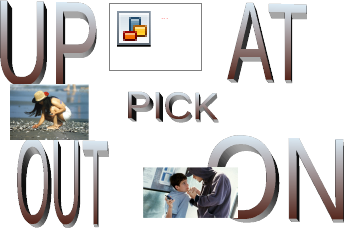

-
to criticize, punish or be unkind to the same person often and unfairly.
-
to go somewhere in order to get somebody or something and bring them back.
-
to get or win something.
-
to choose somebody or something from a group
-
to eat only small amounts of food because you are not hungry or don’t like the food.
-
to lift somebody or something up.
Put the words into the correct order.
-
, he only was ill food his at picked he As.
-
biggest up in on his other class students and Mark he is constantly the picks.
-
for to took dress time It a long prom out a her pick Mary.
-
his went exit up and the picked suitcases to Adam.
-
in for up will the her an probably film performance award pick She.
-
my I kids have up to from pick school.
Fill in at, on, out or up:
-
I
picked … the kids’ clothes that were lying on the floor.
-
He gets picked … by the other boys because he’s so small.
-
Why don’t you pick … someone your own size?
-
She picked … a navy blue dress for the party.
-
She rushed to pick … the baby as soon as it started to cry
-
Most of the time he just picks … his food.
-
She was picked … from dozens of applicants for the job.
-
She sat at the table in silence, picking … her dinner.
7




Fill in the correct preposition: up, out, on, off.
-
The hotels were full so my friends put me ……
-
Firefighters have been called to put …… the fire in the city centre.
-
My son always forgets to put …… his coat when he goes outside.
-
I put …… my new dress before going to the party.
-
The forest fire was put …… by the rain.
-
My house was destroyed by a tornado. Can you put me …… for a few days?
-
I put …… going to the dentist for as long as I could.
-
We had to put …… the match until the next Sunday due to bad weather.
Replace the words in bold with the appropriate phrasal verb:
-
They had to postpone the wedding until her brother returned from abroad.
-
She dressed in her coat and went outside.
-
Firefighters soon stopped the fire.
-
Our friends let us stay at their house for the night.
Describe the situations in the pictures, using the phrasal verbs from the previous exercise.
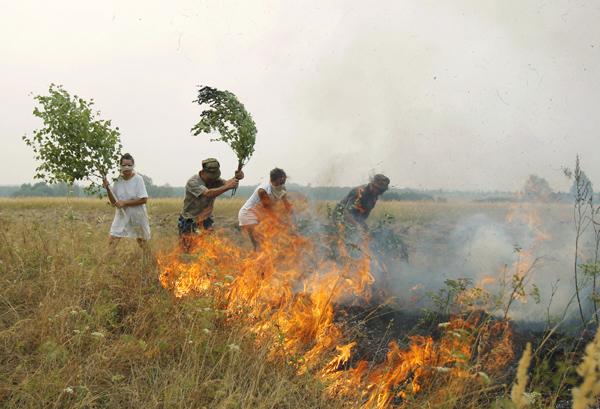
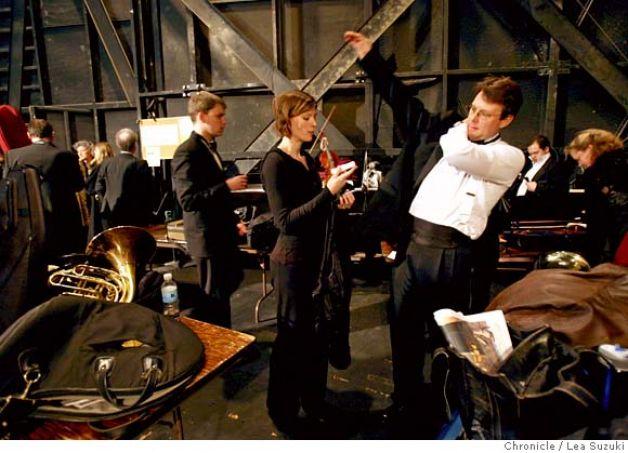

Can you answer the following questions using one of the phrasal verbs in the box?
* put down * put on * put up * take off
1) What do women with long hair sometimes do to their hair when they play sports?
2) What do you say to a child who has just picked up a piece of broken glass?
3) What do people do when they go out in cold weather?
4) What do you do with a sweater when you come into a warm house?
8. Упражнения на фразовые глаголы с come.
Complete the sentences with across, down with, out, over or up with.
-
As I was walking through the town, I came … a group of street performers.
-
We’ve recorded a new album, and it’s coming … in the spring.
-
I came … an old diary in her desk.
-
We finally came … a solution to our problem.
-
I came down … the flu at Christmas.
-
Have you ever come … such a horrible person in all your life?
-
I think I may be coming … cold.
-
A wave of sleepiness came … me.
-
We’ve been asked to come … with some new ideas.
-
He’s behaving so strangely. I don’t know what’s come … him lately.
-
Is that the best excuse you can come …?
-
A wave of anger came … him.
-
The movie comes … next month.
-
I came … a word I’d never seen before.
-
A new magazine is coming … next week.
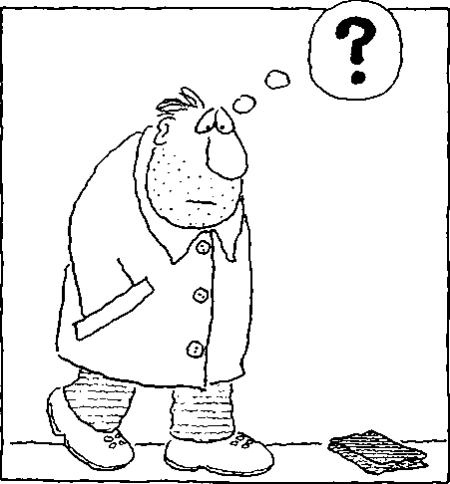
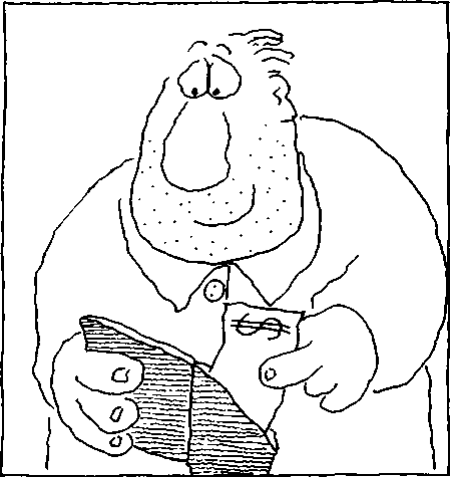
Describe the man.
What is happening?
What can he see?
What has he found?
Did he expect to find it?
Make a sentence describing how he found the wallet.
Think of another way of saying come across.
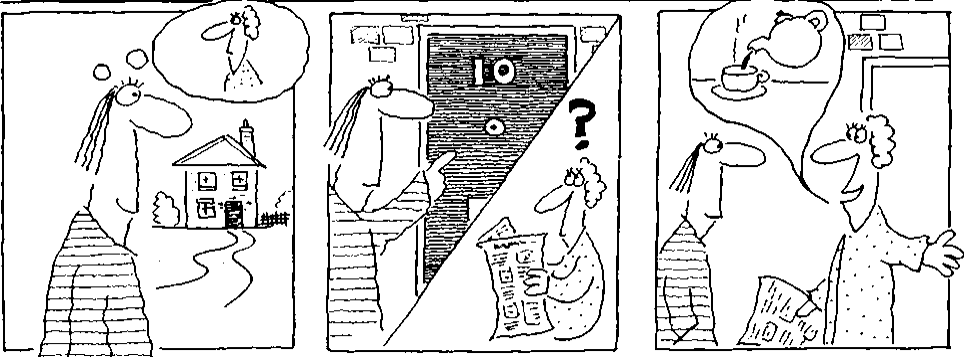
What is the woman doing?
What is she doing now?
What is her friend doing?
Do you think her friend is expecting her?
Is her friend pleased to see her?
What do you think is going to happen next?
Look at picture one and make a sentence describing what the woman decided to do.
Think of another way of saying come round.
What does phrasal verb in bold mean? Match the two columns.
|
|
|
|
|
|
|
|
|
|
|
|
|
|
|
|
|
|
|
|
1.to come about — to happen, to arise
How did it come about that humans speak so many different languages?
2. to come across — to find (something) or meet (someone)
Outside the restaurant, we came across a man doing a fire-eating performance.
3. to come along — to pass, arrive
My teacher came along just as we were talking about him.
4. to come back — to return
It’s suddenly come back to me where I met you.
5. to come by — to obtain something
A good boss is not easy to come by.
6. to come down — to fall, drop or descend
The child, running too fast, came down and hurt his knee.
7. to come from — to arrive from, have one’s origin in
Danger comes from unexpected places.
8. to come into — to begin to be in
The machinery will come into use next week.
9. to come out — to become clear or known
It came out that he had been in prison before.
10. to come to- to reach (a total, condition, or time)
The happy state of affairs must not be allowed to come to an end.
Choose the correct answer:
1. The meaning _____ as you read further.
a. comes into b. comes out c. comes about d. comes down
2. What country do you _____?
a. come across b. come from c. come about d. come by
3. How did it _____ and headed that the man was dismissed?
a. come about b. come across c. come down d. come out
4. A new political party has _____ power.
a. come to b. come from c. come into d. come across
5. A bus should _____ any minute now.
a. come down b. come from c. come along d. come about
6. The two brothers _____ blows during their quarrel.
a. came down b. came across c. came into d. came to
7. We’ll _____ by way of mountains.
a. come back b. come across c. come out d. come about
8. Several trees _____ in last night’s storm.
a. came along b. take up c. take out d. came out
9. I _____ the old photograph in the back of the drawer.
a. came down b. came along c. came across d. came about
10. We _____ this wonderful little restaurant in a back street.
a. came across b. came by c. came out d. came to
9. Фразовые глаголы с turn.
-
Turn against — no longer supported, be hostile to
E.g.: His school mates turned against him after the game.
-
Turn away — refuse entry to
E.g.: The restaurant was so full so we had to turn away customers.
-
Turn back — stop and return the way you have come.
E.g.: The road was blocked, so they were forced to turn back.
-
To turn down — refuse, reject
E.g.: The boss turned down my request for a day out.
-
Turn down — reduce (the volume, heating, etc)
E.g.: Turn town the radio, please!
-
Turn off — stop a light, a machine, tap, etc from giving you light, power, water, etc.
E.g.: Please turn the television off.
-
Turn on — make a light, machine, tap, etc give you light, power, water, etc
E.g.: Please turn the radio on. / Please turn it on.
-
Turn out — switch off the light or gas
E.g.: Could you turn out the light when you leave?
-
Turn to — go to someone for help
E.g.: “Who else can I turn to if I´m in trouble?”
-
Turn up — increase the volume in a radio, etc
E.g.: Don’t turn up the volume! (Don’t turn it up!)
-
Turn up — increase the volume in a radio, etc
E.g.: Don’t turn up the volume! (Don’t turn it up!)
Fill in the gaps using the phrasal verb in the correct form.
-
It was so dark, so I _________________ the light.
-
I don’t want to listen to this radio station. Please _________________ the radio.
-
I asked him _________________ the heating. It’s too hot here.
-
_________________ the sound _________________ — I can’t hear what they’re saying.
-
The people _________________ the government after the taxes changes.
-
We can’t see the road because of this bad weather. Let’s _________________.
-
_________________ the light before you go to bed.
-
We had to _________________ everyone without a ticket for the concert.
-
She _________________ my invitation for a day out.
-
I was in trouble, so I _________________ my mother for advice.
Hilary and her brother are watching TV. Complete what Hilary says in each situation. Follow the example.
She wants to watch the sitcom.
Could you turn the TV on? / Could you turn it on?
-
She can’t hear what they are saying.
Could you ___________________________________?
-
Now it’s too loud.
Could you ___________________________________?
-
The picture is all black and grey — it needs more colour.
Could you ___________________________________?
-
She wants to watch a different programme.
Could you ___________________________________?
-
She doesn’t want to watch TV anymore.
Could you ___________________________________?
Study the meanings:
-
get on – enter a bus, train, plane
-
get off – leave a bus, train, plane
-
get in- enter a car, a van, a taxi
-
get out of- leave a car, van, taxi
-
go out of – leave a room
-
come in- enter a room
-
pick up- lift something; collect something from a place
-
look after – take care of animals, babies, etc
-
look for – try to find something
-
look forward to – wait for or anticipate something pleasant
-
turn on – start a machine
-
turn off- stop a machine
-
call back – return a phone call
-
take off- remove clothes, etc
-
put on- start wearing clothes, etc
-
put in – put something inside a place
-
take out – extract or remove
-
W
rite the correct phrasal verb under the picture:
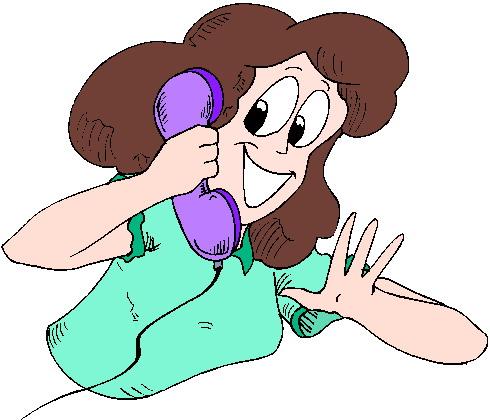
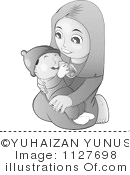

-
______________ 2- ______________ 3- ______________ 4- ______________
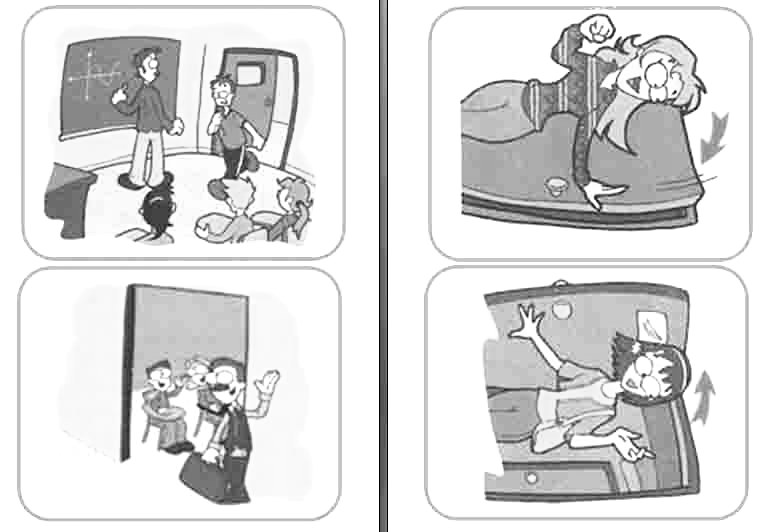
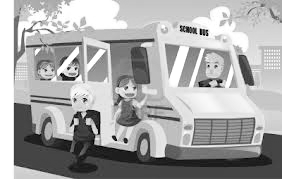

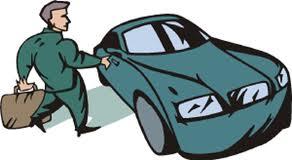
-
______________ 6- ______________ 7- ______________ 8- ______________
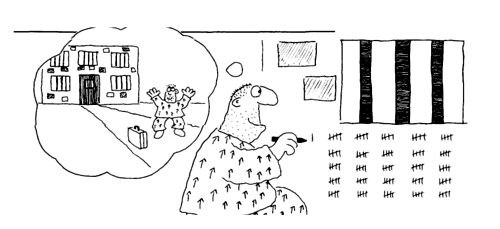

9______________ 10 ______________ 11 ______________ 12_____________
13 ______________ 14 ______________ 15 ______________ 16 _________________
Complete the sentences with the appropriate phrasal verb:
-
I _____________ my coat ________________ before I went out. It was cold.
-
The dentist _______________________ all my wisdom teeth before they started causing any problems.
-
We _______________________ the train at Plymouth and went up to London.
-
We _____________________ the bus and walked to my house.
-
The taxi stopped and we ________________________.
-
We _____________________ of the taxi and paid the driver.
-
The baby sitter _______________________ the kids while the parents were at the movies.
-
I am ___________________________ to meeting you as soon as possible.
-
I ____________________ the TV ______________ and went to bed.
-
I must ____________ her _________ when we get to the office. I couldn´t talk to her because I was driving.
-
It was hot, so I ______________ my jacket __________________.
-
I will ______________ my things ____________________ late
• With
some phrasal verbs, the verb and the particle always come
together, so the object always comes after the particle.
They
looked after the bear cub.
They looked after it.
Ex.18
Match the phrasal verbs in bold in i-6 to the definitions a-f.
-
He
was able to sort the problem out. -
They
came across the bear near a river. -
Tizio
got
over
his injury. -
Their
friends and families saw them off. -
A
van picked
her
up after only five minutes. -
The
van dropped
her
off near the finishing line.
a
felt well or happy again after something bad
b
found
an answer to a problem
с
took someone or something in a car
d
let someone get out of your car
e
met
or found by chance
f
said goodbye to someone who was going on a journey
Ex.19
Which two phrasal verbs in exercise 18 are inseparable?
Put
it
in
the correct place in the sentences.
I
sorted it out before I left work.
-
I
sorted out before I left work. -
I’m
sure you’ll get over soon. -
I’ve
never come across before. -
I’ve
tried to give up many times. -
Why
don’t you pick up on your way home?
Ex.20
Now
think of a noun to replace it
in
each sentence.
I
sorted the problem out before I left work.
Phrasal
verbs and prepositions
Come
across — случайно
встретить, натолкнуться;
Give
up – оставить,
отказаться, бросить;
Run
into – врезаться
в кого-то на машине; встретить случайно,
натолкнуться;
See
off – провожать;
Set
out on
– отправляться в путешествие, выезжать;
Stop
off – остановиться
в пути, сделать остановку;
Ex.21
MATCH THE PHRASAL VERBS TO THEIR MEANINGS
|
a)Come b)Give c)Run d)See e)Set f)stop |
|
Ex.
22 Translate into Russian
1.
Have you ever come across such a horrible person in all your life?
2.
Decide what you want and don`t give up until you`ve achieved it.
3.
The land is ours and we don`t intend to give it up without a fight.
4.
His wife finally persuaded him to give up working late.
5.
I came across your mother the other day.
6.
The soldiers set out on their march to the capital.
7.
We went too fast round the corner and ran into the lamppost.
8.
He saw his friend off at the bus station.
9.
We stopped off in town on the way to Jenni`s house.
Ex.
23 Fill in the gaps
come
across; see off; stop off; give up(2); run into; set out;
1.
I (……) a word I`d never seen before.
2.
Anne (…..) Terry (…..) at the station.
3.
I used to go to the gym, but I (……) years ago.
4.
I (……) the fight and let him have his way.
5.
Three people were killed when their car (……) the side of a train.
6.
After a three-day rest, the travellers (……) again.
7.
Could you (……) at the supermarket and get some bread?
Ex.
24 The
particles
underlined
are
in
the
wrong
sentences.
Rearrange
the
particles
to
make
the
sentences
correct.
1.
I came
off
this
old
lamp
in a
Moroccan
market.
2.
All my
friends
saw me
across
at the
airport.
3.
A bus ran on
my car this morning.
4.
We stopped up
in the village on the way to the airport.
5.
It was a difficult time, but we never gave off
hope.
Ex.
25 The
particles
in
the
sentences
are in the wrong place. Put
them in the correct
place.
1.I
came an old school friend in a tea house across in Darjeeling, India.
2. Let`s stop for a drink off. 3. He saw off his friend at the bus
station. 4. The doctor told him to give alcohol up. 5. On the way
home he ran the bus stop into.
Ex.
26 Translate into English using phrasal verbs
1.
У меня мало времени, надеюсь, ты сможешь
проводить их на вокзал.
2.
Я заеду за вами в шесть и провожу
вас до вокзала.
3.
Угадай, кого я неожиданно встретила
сегодня утром.
4.
Грузовик только что врезался в
легковую машину на светофоре.
5.
Она недавно бросила курить и боится
набрать вес.
6.
В коридоре я только что встретила
незнакомого человека. Ты не знаешь,
кто это?
7.
По дороге на вокзал мы остановились
в кафе, чтобы перекусить.
8.
Темнеет. Пора
отправляться в
путь.
9.
По дороге домой мы встретили
знаменитого исследователя.
10.
Невероятно, но она отказалась
проводить нас.
Соседние файлы в предмете [НЕСОРТИРОВАННОЕ]
- #
- #
- #
- #
- #
- #
- #
- #
- #
- #
- #



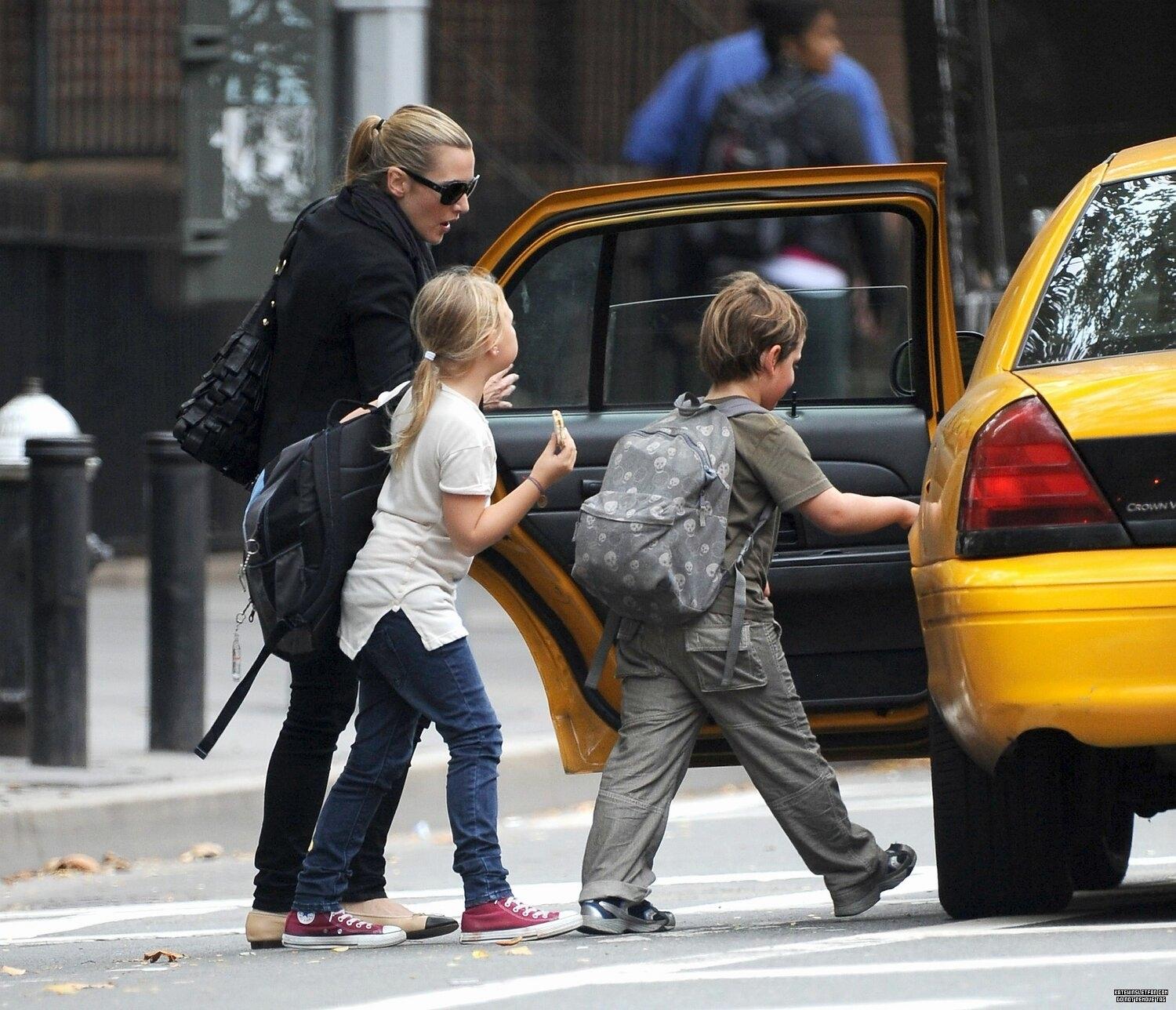 picked … the kids’ clothes that were lying on the floor.
picked … the kids’ clothes that were lying on the floor.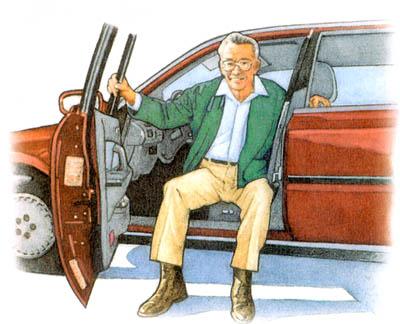 rite the correct phrasal verb under the picture:
rite the correct phrasal verb under the picture: